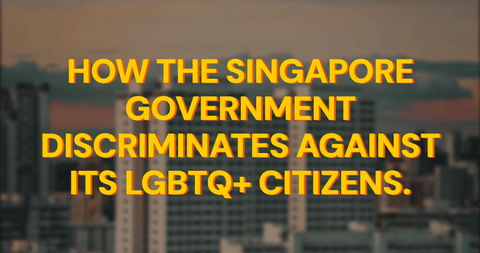Singapore’s Section 377A repeal and constitutional amendment to protect marriage: what do they really mean?
| Updated on
Singapore’s Parliament has announced on 20 October two bills: one that seeks to repeal (i.e. remove) s377A, and another to amend the Constitution with regards to marriage.
These legal changes (especially the constitutional amendment) can be easy to misunderstand. Here’s our understanding of what it means if the bills get passed.
1: Repeal of Section 377A
Section 377A makes sex between men a crime, even when consensual and done in private. This crime comes with up to 2 years of jail time.
Repealing this law means that sex between men will no longer be a crime.
However, it’s worth noting that the government has already promised since 2007 to never actively enforce Section 377A.
Article continues below
On top of that, after 2022's National Day Rally (when the repeal of Section 377A was first announced), various senior Ministers have also confirmed that the government will not make changes to any of the other existing anti-LGBTQ regulations and policies.
So what does repealing Section 377A really do?
The repeal will still be significant: it reflects the government’s acknowledgement of changing public views on discrimination.
However, housing policies will continue to exclude same-sex couples, IMDA / MCI will continue to erase LGBTQ+ representation in media spaces, and every other aspect of institutionalised discrimination against LGBTQ+ folks in Singapore will remain unchanged.
In other words, the repeal of s377A doesn’t mark the arrival of LGBTQ+ equality in Singapore, but rather forms the first step in the long journey towards equality.
We’re not there yet.
2: Constitutional amendment
First, it’s important to know what the proposed constitutional amendment doesn’t do. It does not constitutionally restrict marriage to be between a man and a woman. Here’s why.
Civil marriage in Singapore is defined within the Women’s Charter, where same-sex marriages are already explicitly nullified (note that Muslim marriages are governed by other laws).
The Women's Charter, like all other statutes, require a 50% majority vote in Parliament to be amended. In other words, half of Parliament needs to vote in favour to legalise same-sex marriage.
The Constitution, on the other hand, is special (supreme), and requires a 67% majority in Parliament for any amendments to pass.
Article continues below
The proposed constitutional amendment will not shift the definition of civil marriage from the Women’s Charter to the Constitution. This means that the same 50% majority vote will be needed to legalise same-sex marriage.
So what will the amendment do?
In simple terms, it will make it such that the definition of civil marriages can never be challenged in our courts. Marriage equality will never happen through constitutional challenges. On top of that, it also protects the state’s heteronormative policies from being declared unconstitutional by our courts.
In other words, only Parliament (i.e. elected politicians) will be able to make changes to public policies and legalise same-sex marriage.
If the bill passes, it means that the path to LGBTQ+ equality (both public policies and marriage) would not be made through legal challenges, but through voting in elections and communicating with elected politicians.
It will become more important to vote political candidates who stand with equality into office, and to vote those who stand with discrimination out of office. And as always, raising awareness and understanding amongst the general public will remain important.



